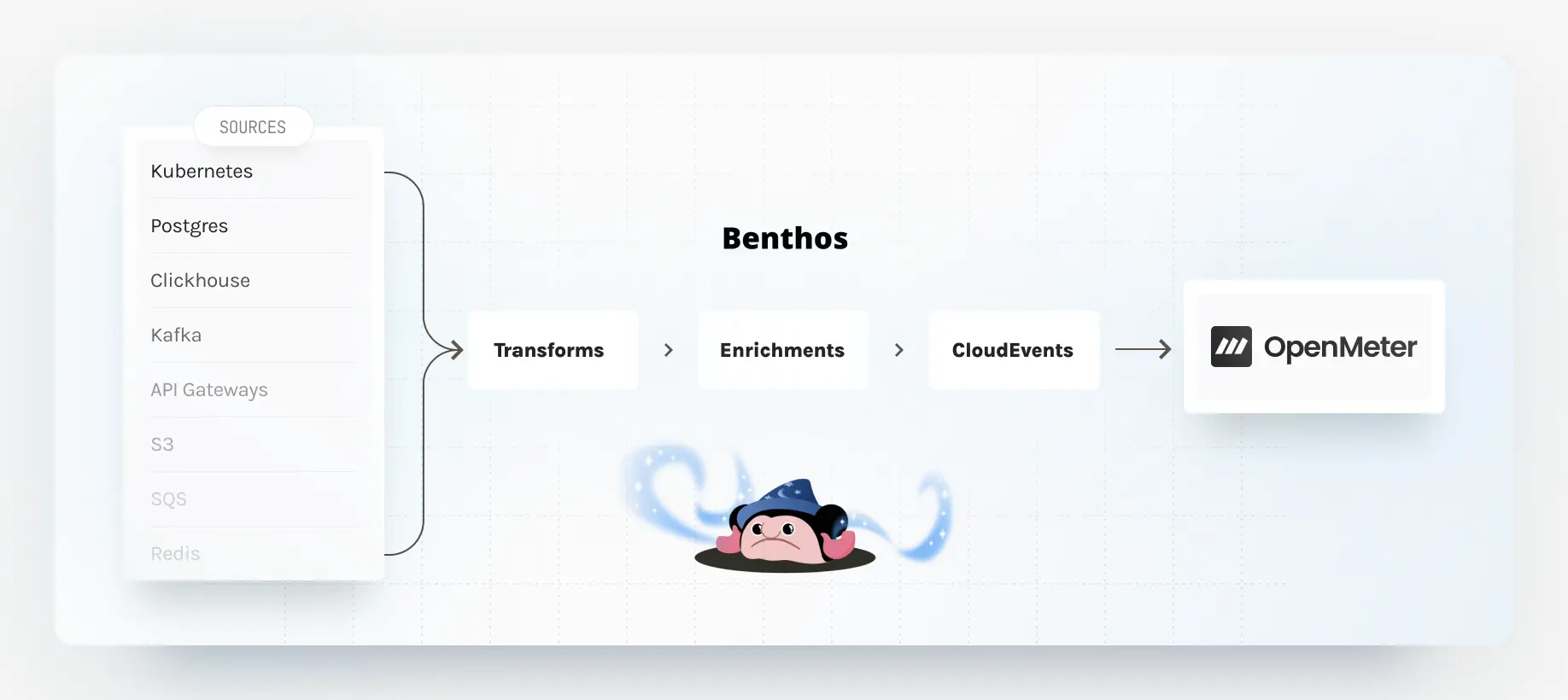How It Works
The OpenMeter Collector is built on top of Redpanda Connect (previously Benthos), a robust stream processing tool that can connect to a wide range of data sources and sinks. The tool's strong delivery guarantees and capability to retry failed messages make it an excellent choice as a collector for OpenMeter.
This page discusses the basics of using Redpanda Connect, focusing on how to configure it as a collector for OpenMeter. To learn more about Redpanda Connect, please review the Redpanda Connect documentation. They have excellent videos and tutorials that will help you get started.
Architecture
Redpanda Connect connects data sources to sinks through a pipeline comprising various processing steps. It reads messages (often referred to as documents in Redpanda Connect and its mapping language, bloblang) from a streaming source, processes them (validation, transformation, enrichment, etc.), and then writes them to one or more sinks. It does so with strong delivery guarantees, ensuring that messages are recovered and will be retried until they are successfully delivered to their destination.

The three major components of a Redpanda Connect pipeline:
- Inputs read data from various sources
- Processors validate, transform, and filter individual pieces of data
- Outputs are sinks where data is sent after being consumed and processed
There are other components (you can read about them here), but these are the ones generally required to ingest data into OpenMeter.
Plugins
The collector offers a plugin architecture that allows users to extend the tool's functionality. To achieve optimal performance, OpenMeter offers a custom Redpanda Connect plugin and distribution that implements ingesting data via the OpenMeter API.
Users with no prior experience with Redpanda Connect can use the OpenMeter distribution available as a binary, container image and Helm chart. Users with custom Redpanda Connect builds can use the OpenMeter Redpanda Connect plugin.
Ingesting data into OpenMeter
Let's work backward through an example of ingesting data into OpenMeter. In this example, we will use the access logs from an API gateway as our data source.
When using Redpanda Connect as an OpenMeter collector, the output of the pipeline is always an OpenMeter instance (cloud or self-hosted):
output:
openmeter:
url: https://openmeter.cloud # default, required for self-hosted
token: '<YOUR OPENMETER CLOUD TOKEN>' # required for OpenMeter CloudAs of today, OpenMeter requires ingested data to be in the CloudEvents format. Redpanda Connect offers a range of processors that can transform, validate, and enrich messages. The most commonly used processor is known as mapping, which utilizes Redpanda Connect' mapping language, bloblang.
Let's assume the API gateway access logs are in the following format:
{
"timestamp": "2021-01-01T00:00:00.000Z",
"method": "GET",
"path": "/app",
"user": "USERID",
"duration": 100
}We can use the mapping processor to transform the data into CloudEvents:
pipeline:
processors:
- mapping: |
root = {
"id": uuid_v4(),
"specversion": "1.0",
"type": "api-call",
"source": "api-gateway",
"time": this.timestamp,
"subject": this.user,
"data": {
"duratio": this.duration,
},
}Finally, you need an input to read data. Given the wide range of data sources supported by Redpanda Connect, we won't be able to go into detail here. Check out the documentation to learn more about the available inputs or reach out to us on one of our support channels to get help integrating Redpanda Connect with your system.
Installation
OpenMeter provides a custom Redpanda Connect distribution, called the Redpanda Connect Collector.
It is available via the following distribution strategies:
- Binaries can be downloaded from the GitHub Releases page
- Container images are available on ghcr.io
- A Helm chart is also available on GitHub Packages
Check out the Helm chart README for configuration details.
Performance tuning
Achieving high throughput is often an essential requirement for usage metering, yet it can be challenging and depends on many factors. Redpanda Connect offers several performance tuning options that can be used to optimize throughput.
Additionally, the OpenMeter Redpanda Connect plugin provides various options that can be utilized to enhance performance.
Please contact us on one of our support channels to learn more about performance tuning.
Last updated on